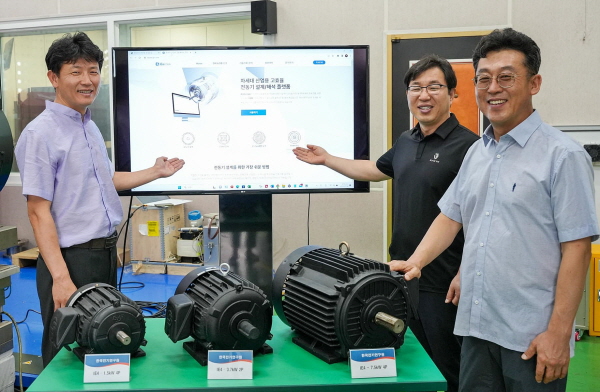한국전기연구원(KERI)이 ‘슈퍼 프리미엄’급 산업용 전동기를 개발하며, 국내 기업들이 고성능 전동기에 접근할 수 있는 기회를 더욱 많이 열었다.

▲한국전기연구원 연구팀(왼쪽부터 한필완·김동준·최재학 박사)이 슈퍼 프리미엄급(IE4)급 산업용 전동기를 개발하고, 기술 확산을 위한 오픈 플랫폼 구축에도 성공했다.
국내 최초 IE4급 효율 달성·기술 확산 오픈 플랫폼 구축
한국전기연구원(KERI)이 ‘슈퍼 프리미엄’급 산업용 전동기를 개발하며, 국내 기업들이 고성능 전동기에 접근할 수 있는 기회를 더욱 많이 열었다.
전기연구원은 전동력연구센터가 국내 최초로 산업용 전동기(삼상유도전동기)의 효율을 ‘슈퍼 프리미엄급(IE4)’으로 개발하는 것을 넘어 중소기업이 관련 기술을 잘 활용할 수 있도록 만드는 ‘오픈 플랫폼’까지 구축하는 데 성공했다고 최근 밝혔다.
산업용 전동기는 전 세계에서 전력을 가장 많이 소비하는 기기다. 우리나라의 경우도 전체 전력 소비량 중 전동기가 차지하는 비중이 무려 50% 이상에 달한다. 지난 2018년 KERI는 전 세계 전동기 효율을 3%만 높여도 1GW급 원전 108기를 짓지 않아도 되고, 가치로 환산하면 약 34조원을 절감할 수 있다는 결과의 보고서를 발행한 바 있다.
산업용 전동기의 효율 향상은 에너지 절감 및 온실가스 감축을 위한 가장 효과적인 수단이다. 이를 위해 많은 나라들이 저효율 전동기 퇴출 정책 시행과 함께 효율이 더 높은 전동기를 의무 사용하게 하고 있으며, 개발에 막대한 예산을 투자하고 있다.
국제전기기술위원회(IEC)에서는 국제 효율 표준에 따라 전동기 등급을 일반(IE1) - 고효율(IE2) - 프리미엄급(IE3) - 슈퍼 프리미엄급(IE4) - 울트라 프리미엄급(IE5) 전동기로 구분한다. 우리나라는 2018년부터 산업 분야에서 IE3급 전동기만 생산·판매하도록 조치하고 있지만, 일부 선진국은 이미 IE4급 규제를 시작하며 앞서가고 있다.
KERI의 성과는 국내 산업용 전동기의 80%를 차지하는 15kW 이하 용량의 전동기를 IE4급으로 높일 수 있는 핵심 원천기술을 개발한 것이다. 이미 IE3급 전동기도 프리미엄이라는 명칭을 가질 정도로 수준이 높다. 그 이상의 목표를 위해 연구팀은 수년간의 연구개발을 거쳐 IE3급 대비 효율이 1∼2%p 이상 높고, 에너지 손실도 20%나 줄일 수 있는 IE4급 전동기를 개발할 수 있었다.
IE4급 달성은 효율 향상뿐만 아니라 재료비 절감도 중요했다. 비싼 재료로 고효율을 달성하는 방법이 용이하지만, 국내 중소기업이 접근 가능한 시장 경쟁력을 확보하는 것에도 중점을 뒀다. 이를 위해 분야별 최고 연구기관들과 손을 잡았다. 전동기는 KERI와 한국전자기술연구원, 생산 제조 공정은 한국생산기술연구원, 재료 기술에는 한국재료연구원이 나섰다. 이들의 전문성이 시너지 효과를 내면서 고효율과 가격 절감이라는 두 마리 토끼를 잡을 수 있었다.
여기에 더해 연구팀은 IE4급 전동기를 산업 현장에 확산·적용하기 위한 ‘웹 기반 오픈 플랫폼(URL: iexdesign.com)’도 구축했다. 기업이 고효율 전동기를 제대로 사용하기까지는 많은 연구개발 투자, 숙련된 전문가의 설계 능력, 고가의 외국산 해석 프로그램이 필요하다. 중소기업 입장에서는 엄두를 내기 힘든 상황이었는데, KERI가 한국전자기술연구원, ㈜클루와 함께 개발한 설계 프로그램과 오픈소스 기반 해석 프로그램을 활용하여 기존 대비 낮은 비용으로 오픈 플랫폼을 제공할 수 있었다. 이미 과제 수행 기간(2019년~2022년) 동안 함께했던 기업들의 전동기 매출 실적이 연평균 20% 이상 증가하는 등 큰 효과를 본 상황이라 기술의 파급력이 기대된다.
KERI 한필완 박사는 “전동기의 설계, 재료 활용, 생산 공정 데이터베이스 등을 제공하는 오픈 플랫폼을 통해 국내 기업들이 IE4급 산업용 고효율 전동기 기술에 대한 진입 장벽을 크게 낮출 수 있을 것”이라며 “국내 수요기업이 IE4급 고효율 전동기를 적극적으로 도입하여 에너지 위기에 대응할 수 있도록 정책적인 지원과 홍보도 필요하다”고 덧붙였다.
2023년 글로벌 산업용 전동기 시장은 680억 달러 규모다. 국내 산업용 전동기 시장은 20억 달러 규모이고, 연평균 성장률은 7.9%로 예측된다, 우리나라는 탄소중립 실현을 위해 2026년까지 IE4급 전동기 규제를 시행할 것으로 예상되며, 이 시기에 많은 전동기 기업이 성장할 것으로 보고 있다.
기술 관련 SCI(E)급 논문(11편) 게재와 특허(11건)를 다수 출원한 KERI는 15kW급 이상 200kW 이하 중대형 용량에 대한 IE4급 전동기 개발, IE5급을 위한 가변속 및 비 희토류 영구자석 전동기 개발 등 시대적 요구에 대비한다는 목표다.
한편 이번 연구는 산업통상자원부 산하 한국에너지기술평가원 주관의 ‘에너지수요관리핵심기술개발사업’을 통해 지원된 ‘차세대 고효율(IE4) 전동기 오픈플랫폼 구축 및 운영’ 과제(2019년 5월∼2022년 12월)로 진행됐다.
그동안 KERI는 한국에너지기술평가원의 지원을 바탕으로 ‘프리미엄급 고효율 유도 전동기’, ‘최저효율제 시행에 따른 고효율 유도 전동기’, ‘인버터 구동형 슈퍼프리미엄(IE4) 동기릴럭턴스 전동기’ 등 꾸준히 중소·중견기업의 고효율 전동기 기술력 확보를 위한 연구를 수행해왔다.
